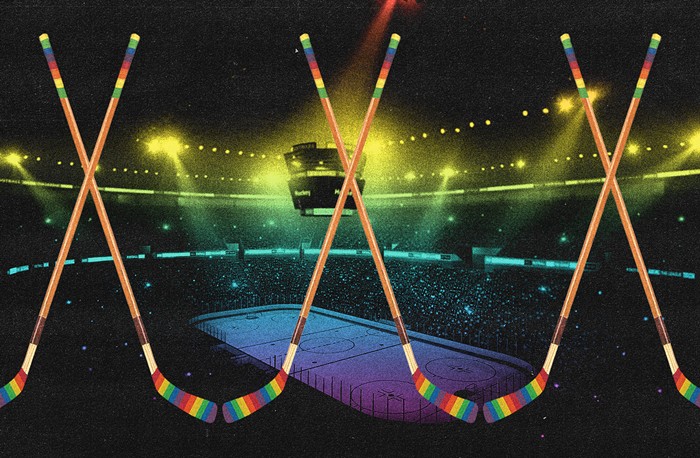
Croatia emerged victorious over England yesterday, cementing the World Cup final match-up this Sunday between the scrappy Slavs and 1998's winner, France.
Amid a 100-plus crowd watching intently on an outdoor screen in Occidental Square, Matthew Marinovich rocked a red-and-white checkered jersey and waved a massive Croatian flag.
Marinovich, a family counselor, keeps the flag in his office and trotted it out for Croatia’s biggest soccer victory since becoming an independent nation in 1991. His great-grandfather was born in Croatia and he inherited the family name. As he spelled it for me, Dina Legan spoke up. “That’s not how they spell it in Croatia,” she said.
Legan was born in Croatia and sported some red in her office attire for the day, but otherwise you’d never guess how tortured the otherwise beautiful summer Wednesday left her. “I’m very nervous and my heart is racing,” she told me at halftime, when Croatia was down 1-0.
Every four years, my sporting diet consists of unhealthy amounts of soccer, from bleary-eyed 7 am matches nursing bottomless coffee at Lost Lake, to long lunches that make me feel positively European. Along the way, I’ve been reminded of just how international Seattle is, with the quadrennial global spectacle encouraging foreign nationals to wear their sporting allegiance loud and proud.
With no Team USA to root for, I’ve been bandwagoneering every game. I high-fived Croatians at Rhein Haus last weekend when they topped Russia, jockeyed for a spot with the French faithful on the sidewalk in front of Café Presse, and sympathized with Colombian fans who burst into tears after losing a heartbreaker game to England on penalties.
About one in five King County residents was born outside the US, but walking down the street here, there’s no way to tell what passport someone holds—people of all races and ethnicities have US citizenship, despite the Trump administration’s best efforts to make it otherwise. World Cup season, on the other hand, has turned Seattle into a Where’s Waldo of jerseys on match days—spot the Japanese fan on Pike hours after they lost to Belgium, how many canary-yellow Brazil jerseys can you find wandering downtown?, etc.
Of course, it’s a supremely shitty time to be an immigrant in the US. An African fan was none too happy that I was photographing the crowd at yesterday’s Occidental Square viewing party—and I wouldn’t put it past ICE to stake out World Cup fans to issue deportation orders either. As France took on Belgium, a Trinidadian friend among my soccer-watching crew fretted about the latest reports of Trump-era machinations to make it harder for legal visa holders to stay in the US.
But overall, the soccer pitch has been a great equalizer. During Mexico vs. Brazil, the crowd had already packed Café Presse to the gills, so three Amazon employees—one an El Tri diehard—and I huddled over my laptop in the parklet out front to stream the Telemundo feed. After the game, they raced off to their six-figure tech jobs and I went back to hustling freelance writing gigs. But for 90 minutes we were all just fans.
Nowhere has soccer-as-social-leveler been more evident than in Occidental Square, our one public space imbued with soccer resonance and the starting point of the Sounders’ March to the Match. It’s also our tiny slice of the global fan experience.
Every game, the TV cameras pan to a packed plaza in Bogotá, London, Zagreb, or Rio as thousands cheer on their team. We have nothing like the beer-champagne supernova in public squares across the UK yesterday that was spurred by England’s lone goal—nor did I want to spend the rest of the match soaked and sticky—but the crowds that have gathered routinely for the free, outdoor showings of 11 am games are a remarkable slice of life in an increasingly wealth-segregated region.
After an amiable halftime chat with an English soccer dad from Bainbridge Island who commended the U.S. for offering better soccer opportunities for his two daughters than he might find in the UK for girls, he unleashed his inner verbal hooligan as he dropped f-bombs and hurled cries of “Wanker!” at the referee as England neared defeat. Nearby, I chatted with a trio of Mexican day laborers who slagged off waiting for work in front of Home Depot in favor of the Cup’s final rounds.

“It’s once every four years,” shrugged Antonio Hernandez at his decision to choose soccer over a day’s wages as he offered me a taste of the homemade ceviche he brought to the park. Originally from Guadalajara, he regaled me with tales of watching the Cup live when it came to Mexico in 1970 and 1986, and replayed for me Manuel Negrete’s goal for Mexico over Bulgaria 32 years ago—widely considered the best in World Cup history.
Both the English and Mexican fans agreed that US passion for the sport leaves something to be desired, but held out hope that 2026 World Cup games in the US—and likely in Seattle—could help change that. (The usual caveats about FIFA corruption apply, but I’d rather we host the Cup in a venue that's already operational than fuel the slave labor machine in Qatar.)
Without pesky working hours getting in the way, I suspect the Sounders free watch party in Seattle Center on Sunday will have a heavier US contingent than weekdays in Occidental Square, though Seattle is crawling with French-speakers of late, so expect plenty outcries of “Allez les bleus!”
It will be gratifying to see so many Seattleites turn out for the world sport at a time when the US government is turning away from the world. But Seattle Center’s 1962-era prototype for the modern theme park doesn’t pack the same sense of public space as Occidental Square, which, for the last month, has been the heartbeat of global Seattle.













